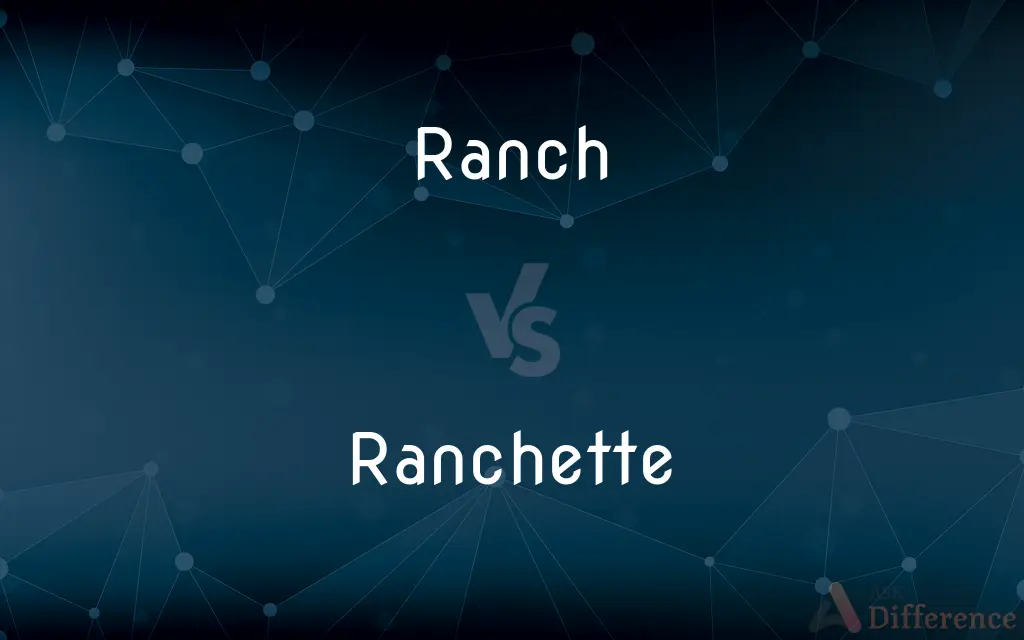Ranch vs. Ranchette — What's the Difference?
Edited by Tayyaba Rehman — By Fiza Rafique — Updated on May 17, 2024
A ranch is a large farm focused on raising livestock, while a ranchette is a smaller property with similar functions, often used for hobby farming or a rural lifestyle.

Difference Between Ranch and Ranchette
Table of Contents
ADVERTISEMENT
Key Differences
A ranch is a substantial agricultural property dedicated to raising livestock such as cattle, horses, and sheep. It typically spans large areas of land, often hundreds or thousands of acres, and involves commercial-scale farming operations. Ranchettes, however, are smaller properties, usually ranging from a few to several dozen acres, designed for those seeking a rural lifestyle or hobby farming rather than commercial agricultural production.
Ranches are primarily focused on livestock production and may include extensive grazing areas, barns, and other infrastructure to support large-scale farming activities. They often require significant investment and labor to manage effectively. Ranchettes, on the other hand, offer a more manageable size and are often chosen by individuals looking to enjoy country living, perhaps with a few animals or a small garden, without the demands of a full-scale ranch.
Ranches contribute significantly to the agricultural economy, producing meat, dairy, and other livestock products. They are usually found in regions suitable for extensive grazing and often involve a mix of natural and cultivated land. Ranchettes are more versatile, sometimes serving as part-time residences or retreats for city dwellers seeking tranquility and a connection to nature.
While ranches are operationally intensive, requiring skilled labor and robust management practices to handle large herds and maintain land health, ranchettes are typically more relaxed in their requirements. Owners of ranchettes may engage in light farming activities such as growing vegetables, keeping a few chickens, or maintaining horses for recreational purposes.
Ranches often include multiple buildings and facilities to support their extensive operations, such as large barns, corrals, equipment storage, and housing for workers. Ranchettes are more modest in scale, usually featuring a single family home and possibly a small barn or stable.
ADVERTISEMENT
The lifestyle associated with ranches is one of hard work and often long hours dedicated to animal husbandry and land management. Ranchette owners enjoy a more leisurely pace, balancing small-scale agricultural activities with the comforts of a rural home environment.
Comparison Chart
Size
Large, hundreds to thousands of acres
Small, a few to several dozen acres
Purpose
Commercial livestock production
Hobby farming, rural lifestyle
Infrastructure
Extensive (barns, corrals, grazing areas)
Minimal (home, small barn or stable)
Economic Role
Significant contributor to agriculture
Typically not commercially oriented
Management
Intensive, requires skilled labor
Light, often managed by the owner
Lifestyle
Demanding, labor-intensive
Leisurely, balanced with rural living
Compare with Definitions
Ranch
Extensive land area used for grazing animals.
The ranch spans over 1,000 acres of rolling hills.
Ranchette
A rural residence with some agricultural activity.
The ranchette offers a peaceful retreat from city life.
Ranch
A property with infrastructure to support large-scale farming.
The ranch includes several barns and a large corral.
Ranchette
A small-scale property with rural characteristics.
They bought a ranchette to enjoy country living.
Ranch
A large farm dedicated to raising livestock.
The family runs a cattle ranch in Texas.
Ranchette
A smaller version of a ranch, designed for personal use.
The ranchette is perfect for keeping a couple of horses.
Ranch
A commercial agricultural operation focused on meat production.
The ranch produces beef that is sold nationwide.
Ranchette
A property often used for hobby farming.
The ranchette has a small vegetable garden and a few chickens.
Ranch
A rural estate managed for livestock breeding and care.
The ranch is known for its high-quality horses.
Ranchette
A property that balances farming with residential comforts.
Their ranchette includes a cozy home and a small stable.
Ranch
A ranch (from Spanish: rancho) is an area of land, including various structures, given primarily to ranching, the practice of raising grazing livestock such as cattle and sheep. It is a subtype of a farm.
Ranchette
A small ranch or large home lot, often on the outskirts of a major metropolitan area and just past the planned neighborhoods, consisting of 40 acres and a house and possibly a barn or other outbuildings.
Ranch
An extensive farm, especially in the western United States, on which large herds of cattle, sheep, or horses are raised.
Ranch
A large farm on which a particular crop or kind of animal is raised
A mink ranch.
Ranch
The building on a ranch occupied by its operator; a ranch house.
Ranch
A one-story house, usually having a low-pitched roof; a ranch house.
Ranch
To manage or work on a ranch.
Ranch
A large plot of land used for raising cattle, sheep or other livestock.
Ranch
A small farm that cultivates vegetables and/or livestock, especially one in the Southwestern United States.
Ranch
A house or property on a plot of ranch land.
Ranch
(uncountable) Ranch dressing.
Ranch
To operate a ranch; to engage in ranching.
Formally the widow still ranches, but in fact she leaves all ranching to the foreman.
Ranch
To work on a ranch.
Bill had ranched only five years when his dad made him foreman.
Ranch
To wrench; to tear; to sprain; to injure by violent straining or contortion.
Ranch
A tract of land used for grazing and the rearing of horses, cattle, or sheep. See Rancho, 2.
Ranch
Farm consisting of a large tract of land along with facilities needed to raise livestock (especially cattle)
Ranch
Manage or run a ranch;
Her husband is ranching in Arizona
Common Curiosities
What size is typical for a ranchette?
Ranchettes typically range from a few to several dozen acres.
Do ranches require more infrastructure than ranchettes?
Yes, ranches usually have extensive infrastructure like barns, corrals, and grazing areas.
Are ranches only used for cattle?
No, ranches can raise various livestock, including cattle, horses, sheep, and goats.
Can a ranchette produce commercial livestock?
Generally, ranchettes are not used for commercial livestock production due to their smaller size.
Do ranchettes contribute to the agricultural economy?
Typically, ranchettes do not have a significant economic impact compared to larger ranches.
What is the main difference between a ranch and a ranchette?
A ranch is a large property for commercial livestock production, while a ranchette is a smaller property for hobby farming or rural living.
Can ranchettes be used for recreational purposes?
Yes, ranchettes are often used for recreational activities like horse riding or gardening.
Can you live on a ranchette full-time?
Yes, ranchettes are often used as full-time residences.
Are ranches more labor-intensive than ranchettes?
Yes, ranches require more labor and management due to their larger scale.
Are ranches typically family-owned?
Many ranches are family-owned, passed down through generations.
Do ranches have multiple buildings?
Yes, ranches often have multiple buildings to support their operations.
Is it possible to have a garden on a ranch?
Yes, many ranches include gardens or other small-scale agricultural activities.
Do you need special skills to manage a ranchette?
Managing a ranchette requires fewer skills compared to running a large ranch.
Can ranchettes be found in urban areas?
Ranchettes are usually located in rural or semi-rural areas, not urban settings.
Is a ranchette a good investment for someone seeking a rural lifestyle?
Yes, ranchettes are ideal for those looking for a rural lifestyle with light agricultural activities.
Share Your Discovery

Previous Comparison
Conviction vs. Indictment
Next Comparison
Cage vs. CrateAuthor Spotlight
Written by
Fiza RafiqueFiza Rafique is a skilled content writer at AskDifference.com, where she meticulously refines and enhances written pieces. Drawing from her vast editorial expertise, Fiza ensures clarity, accuracy, and precision in every article. Passionate about language, she continually seeks to elevate the quality of content for readers worldwide.
Edited by
Tayyaba RehmanTayyaba Rehman is a distinguished writer, currently serving as a primary contributor to askdifference.com. As a researcher in semantics and etymology, Tayyaba's passion for the complexity of languages and their distinctions has found a perfect home on the platform. Tayyaba delves into the intricacies of language, distinguishing between commonly confused words and phrases, thereby providing clarity for readers worldwide.













































